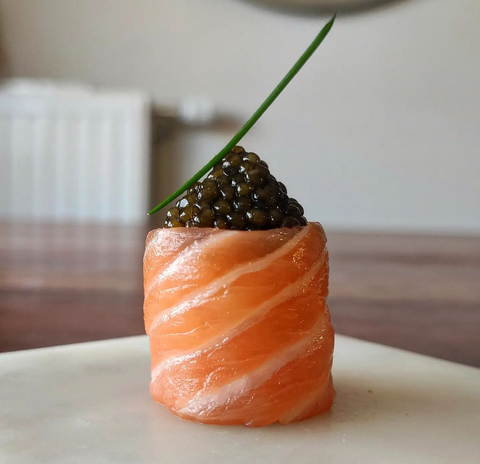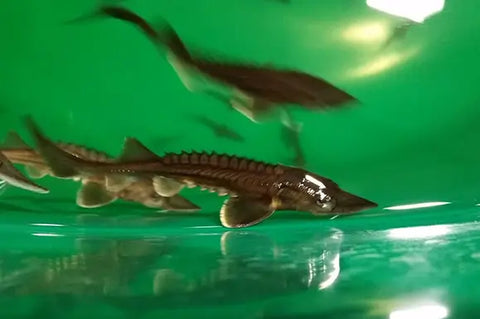How does caviar taste? Does caviar taste good? Bad? Is caviar fishy? Is it salty?
These are some of the questions we get on a daily basis and with good reason. Caviar is somewhat of an exclusive delicacy and certainly a very expensive one.
The flavors, notes, and hints are plentiful making them special yet mysteriously hard to put into words.
In this guide, we’ll walk you through the various flavours of sturgeon caviar so you’ll know exactly what to expect when you finally get the chance to try it.
How Does Caviar Taste?
Interestingly enough, describing the taste of caviar is not straightforward.
These rare fish eggs from the sturgeon family of fish have a complex flavour much like expensive wine or premium coffee. So, what does caviar taste like?
Caviar tastes buttery (rich and creamy), slightly salty, and has ocean-like notes with light and delicate fish and nutty hints.

These small velvety pearls have an incredibly smooth, uniform, and soft texture yet offer a surprisingly refreshing pop and burst of flavour when chewed.
While different types of sturgeon caviar exhibit different flavours, the taste elements can be distributed as illustrated in the image below.
Breaking Down the Flavors of Caviar
In this section, we discuss each of the five flavour elements in detail to help you gain a better understanding of what to expect when trying caviar for the first time.
It’s important to note that these elements are found in all caviar but can vary in strength based on whether the fish is wild or farmed, young or old, its living conditions, feed, environment, and more.
Buttery
Fish eggs, such as caviar, have a relatively high fat content, which translates into a rich and fatty flavour.
Since caviar is consumed in relatively small quantities at a time, this element of flavour is present but not overwhelming. It’s quite tasty and pleasant.
This aspect is quite consistent amongst the various types of caviar.
Salty
In case you were not aware, caviar is not just sturgeon fish eggs, it’s salt-cured and aged sturgeon roe.
As such, it’s no surprise that sturgeon roe cured in salt has a salty flavour element.
This part of the flavour is noticeable but definitely not overbearing. It’s kind of like parmesan or potato chips – you just can’t get enough.
Again, this aspect is quite consistent across different kinds of caviar since it’s part of the production process.
Fishiness
Caviar is cured fish eggs, which obviously come from a fish (duh!) so the presence of this taste element should not come as a surprise to anyone.
Fishy tastes and smells scare even the most avid seafood lovers away. Luckily, the taste of fish is the mildest of all flavours found in caviar.
It’s important to note, that other fish roe other than sturgeon such as salmon can be quite fishy. Check out our article on the differences between caviar and fish roe to learn more.
The fishy taste can be described as a very mild metallic (iodine) and sour flavour, which overlaps with the salty notes and ocean flavours.
While the description doesn’t sound particularly appealing, it unquestionably adds an element of tartness that balances out the strong buttery tastes.
Ocean
The ocean element carries the complex flavours of minerals and salty tones, yet it is incredibly refreshing similar to a freezing cold fresh oyster.
In fact, many people believe that oysters and caviar share common flavour profiles.
This brings a slight tanginess and freshness to what would otherwise be fatty and salty roe.
Nutty
The last flavor element is an interesting one as you would not necessarily expect to find it in seafood.
However, the nutty and earthy tones do a wonderful job of balancing a heavily weighted set of maritime flavours.
The nutty and earthy aspects of caviar are somewhat of a mystery. It is believed that it’s a product of being a bottom feeder – one that focuses on prey that lives at the bottom of oceans, rivers, and lakes.
However, this theory has been disproven since the nutty flavour is present even in farmed caviar.
Does Caviar Taste Good?
If you’ve been reading along, you should have a pretty good idea of what sturgeon caviar tastes like.
Considering the insatiable demand for this delicacy it’s clear that people love its taste. But as the French proverb goes Every man to his taste.
If you like seafood, delicacies with complex flavours, and salty and savoury foods, there is a good chance that you will think that caviar tastes good.
If you’re afraid of the fishy taste (or smell) of caviar all we can say is don’t be. It’s incredibly faint and it definitely won’t be the flavour you remember nor the one that lingers in your mouth.
So, does caviar taste good? There’s only one way to find out and that’s by trying it.

What Does Caviar Taste Similar To?
The taste of caviar is complex and multifaceted. It bears similarities to ocean water flavours found in fresh oysters (fresh, minerally, and salty taste) but it is more rich and creamy.
Does Caviar Taste Fishy?
Real caviar (fish roe from sturgeons) does not taste fishy. While it does have a fishy element as part of its flavour, it’s not pronounced and acts to balance out the natural fatty flavours of the eggs.
Fake caviar – fish eggs from all other types of fish such as salmon – can have a rather pronounced fishy taste.
Beluga (Sturgeon) Caviar Taste
Beluga is highly prized amongst caviar connoisseurs – it sits at the very top of the caviar world. As a matter of fact, it is one of the most expensive foods in the entire world.
Beluga caviar is recognized for its large black pearly eggs and is known to taste very rich, smooth, buttery, and salty. Out of types of caviar, it is the least fishy kind.
The beluga sturgeon produces the largest and darkest (black) roe out of all marine animals.
Beluga caviar comes from the beluga sturgeon (a fish), not beluga whales. Whales are mammals so they do not lay eggs.
This endangered species of the sturgeon family is one of the largest fish on earth reaching up to 20ft. (6m) in length and up to 2,600 lbs (1,220 kg) in weight.

What Does Expensive Caviar Taste Like?
There is no such thing as inexpensive caviar since real caviar (eggs from the sturgeon fish family) is never exactly cheap.
Remember, cheap “caviar” such as salmon, tobiko, or masago fish eggs is not real caviar! The caviar comes exclusively from the sturgeon fish species.
Curious about caviar prices? Check out our Ultimate Guide to Caviar Prices.
Bearing that in mind, the question of what does expensive caviar taste like is in fact synonymous with what does real caviar taste like?
Expensive caviar has a rich, creamy, slightly salty taste with ocean-like notes, and a soft fish and nutty finish.
What Does Black Caviar Taste Like?
Black Caviar, which is the fish roe from the exclusive sturgeon family, has a rich, buttery, creamy, and salty taste with soft hints of fish and nuts.
What Does Bad Caviar Taste Like?
Assuming it’s not spoiled, bad caviar can be characterized as having an overbearing fishy smell and taste.
Bad caviar will develop this bad smell and taste when not fresh, not properly sealed, and/or stored.
If you are referring to bad caviar as low-grade “caviar” such as trout or salmon fish eggs, it’s important to remember that is not caviar but actually fish roe.
In this case, “bad caviar” or fish roe, is characterized as having more of a fishy taste with delicately sweet and salty flavour elements.
Compared to real caviar, it is bland, fishier, and less savoury.
Key Takeaways
- Caviar has 5 primary flavour profiles (buttery, salty, fishy, ocean, and nutty)
- Caviar is rich and salty with undertones of ocean, fish, and nut flavours
- Caviar tastes similar to oysters but with a richer flavour, a less pronounced ocean taste, and a different texture
Sources:
- CaviarHub.ca Research
- The physics of the mouthfeel of caviar and other fish roe – International Journal of Gastronomy and Food Science
- Effects of microbial diversity and phospholipids on flavor profile of caviar from hybrid sturgeon – Food Chemistry
- Off-Flavors in Aquacultured Fish: Origins and Implications for Consumers – MDPI
- Animal Diversity Web (ADW) – Huso Huso Beluga



